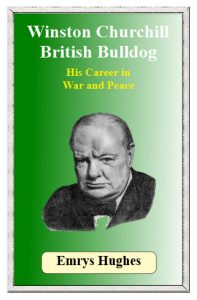WINSTON CHURCHILL has been the most colourful and picturesque leader of the British Tory Party since Benjamin Disraeli. For half a century he has been a challenging figure in our public life. After the outbreak of the Second World War he became as well known in Europe and America as at home, and his admirers regard him as the greatest Englishman of our time. During the war it became almost treason or sacrilege to criticize Mr. Churchill. He was regarded as the voice of Britain, the great heaven-sent leader who had emerged in our dire peril to save us and guide not only Britain but the Western and democratic world to victory over the forces of darkness.
No wonder the Tory Party, in its desperation, decided to cash in on his wartime reputation as our deliverer. Indeed, he was about the only asset the discredited post-war Tories had, and they have played him up, with his manifest approval, to the limit of their ability.
So there has grown up a Churchill legend: of Churchill the one and only national leader who is capable of being the head of a British Government in difficult times, of a man who was always right in the years prior to the war and who during the war guided us with supreme wisdom. The Tories have done their best to bask in his reflected glory, forgetting that the harshest and truest things Winston Churchill ever said in his life were about them.
But there is more to be said about Winston Churchill than is to be found in his own many volumes on war and politics, his autobiographical reminiscences, and the adulatory biographies that have been published in recent years.
Mr. Churchill has contributed copiously to the history of our time, and, of course, no man can really be expected to be completely objective about himself. The prima donna is not the most reliable critic of her own performances. Reading Mr. Churchill’s
memoirs is very much like reading an appreciative drama review written by the actor who has also played the part of hero in the production. Mr. Churchill’s war books are, in the main, justifications and apologia for his own performances.
Now, nobody will deny that Winston Churchill has been pugnacious, courageous, an outstanding personality, a champion all-in wrestler in the political conflicts of his day, that his speeches have been eloquent and have stirred the multitudes, that he has a great command of the English language, that he can tell a good story, that he has a gay versatility and a sense of humour and other qualities which appeal to a large number of the British people, even to many who would rather be carried out of the polling booth dead than vote for him or any of his Tory candidates.
